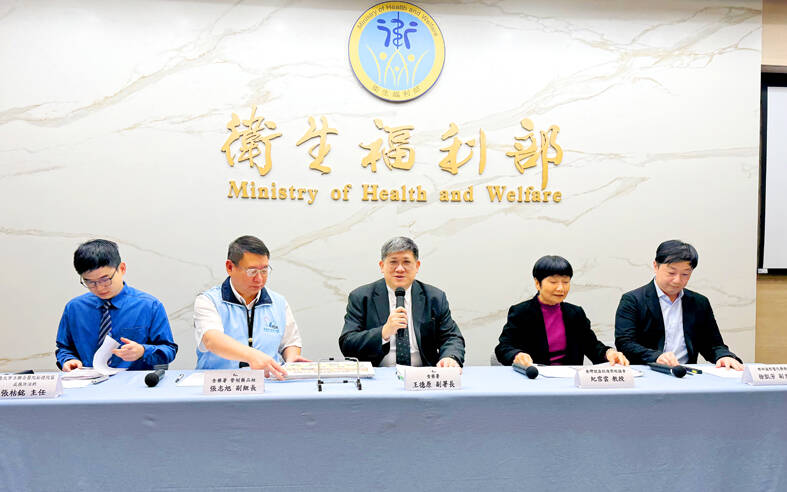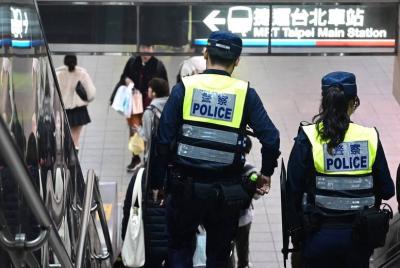Sleeping pills should only be taken based on the prescribed dosage and frequency to avoid addiction and drug abuse, a doctor warned yesterday.
Taipei City Hospital Songde Branch Division of Addiction Prevention doctor Chang Hu-ming (張祜銘) said the hospital recently treated a 40-year-old woman for drug abuse after she began using a sedative-hypnotic drug prescribed for sleep to deal with stress.
She gradually increased her dosage, eventually up to 10 pills a day, resulting in addiction, Chang said.

Photo: CNA
Many people addicted to sedative-hypnotic medication unconsciously ingest more than is prescribed, eventually developing symptoms such as sleepwalking or memory loss, he said.
People who find themselves taking such drugs to handle stress or are experiencing symptoms of withdrawal should check themselves into an addiction prevention center, he said.
Chang said he previously treated a 30-year-old man habitually taking zopiclone to help him sleep.
The man would sometimes drink alcohol and read before bed, but often forget which chapter they had read, Chang said.
Family members had told the man that he would sometimes cook, but not remember it, he added.
Landseed International Hospital Pharmacy Division deputy director Hsu Kai-fang (徐凱芳) said that mixing sleeping pills with alcohol would have adverse effects and should be avoided.
As the effects of sleeping pills vary, people should follow their doctors’ prescription to avoid abuse, Hsu said.
The Food and Drug Administration (FDA) said that hospitals and doctors can access a patient’s medical records through their National Health Insurance card to avoid overprescribing medications.
The FDA urged people not to treat sleeping pills as a cure-all for sleep loss or insomnia, adding people should refrain from buying over-the-counter sleeping pills, increase dosage or stop taking medication entirely without consulting their physician.
Avoid taking sleeping pills with alcohol, do not operate machinery or vehicles after taking them, and do not sell or distribute sleeping pills to others, it added.

Beijing could eventually see a full amphibious invasion of Taiwan as the only "prudent" way to bring about unification, the US Department of Defense said in a newly released annual report to Congress. The Pentagon's "Annual Report to Congress: Military and Security Developments Involving the People's Republic of China 2025," was in many ways similar to last year’s report but reorganized the analysis of the options China has to take over Taiwan. Generally, according to the report, Chinese leaders view the People's Liberation Army's (PLA) capabilities for a Taiwan campaign as improving, but they remain uncertain about its readiness to successfully seize

Taiwan is getting a day off on Christmas for the first time in 25 years. The change comes after opposition parties passed a law earlier this year to add or restore five public holidays, including Constitution Day, which falls on today, Dec. 25. The day marks the 1947 adoption of the constitution of the Republic of China, as the government in Taipei is formally known. Back then the Chinese Nationalist Party (KMT) governed China from Nanjing. When the KMT, now an opposition party in Taiwan, passed the legislation on holidays, it said that they would help “commemorate the history of national development.” That

Taiwan has overtaken South Korea this year in per capita income for the first time in 23 years, IMF data showed. Per capita income is a nation’s GDP divided by the total population, used to compare average wealth levels across countries. Taiwan also beat Japan this year on per capita income, after surpassing it for the first time last year, US magazine Newsweek reported yesterday. Across Asia, Taiwan ranked fourth for per capita income at US$37,827 this year due to sustained economic growth, the report said. In the top three spots were Singapore, Macau and Hong Kong, it said. South

Police today said they are stepping up patrols throughout the Taipei MRT system, after a social media user threatened to detonate a bomb at an unspecified station this afternoon. Although they strongly believe the threat to be unsubstantiated, Taipei Metro police and the Railway Police Bureau still said that security and patrols would be heightened through the system. Many copycat messages have been posted since Friday’s stabbing attacks at Taipei Main Station and near Zhongshan MRT Station that left three dead and 11 injured, police said. Last night, a Threads user in a post said they would detonate a bomb on the Taipei